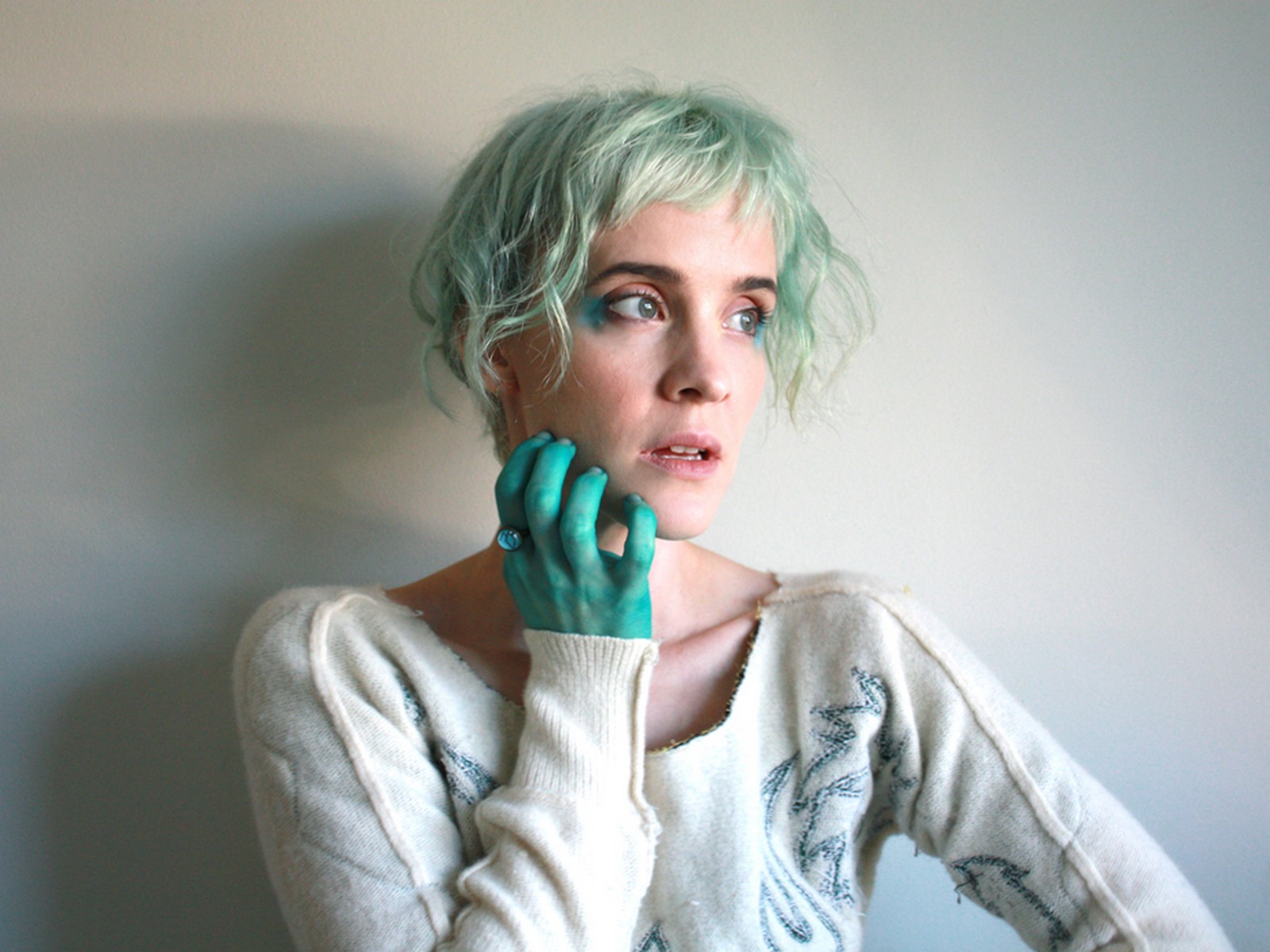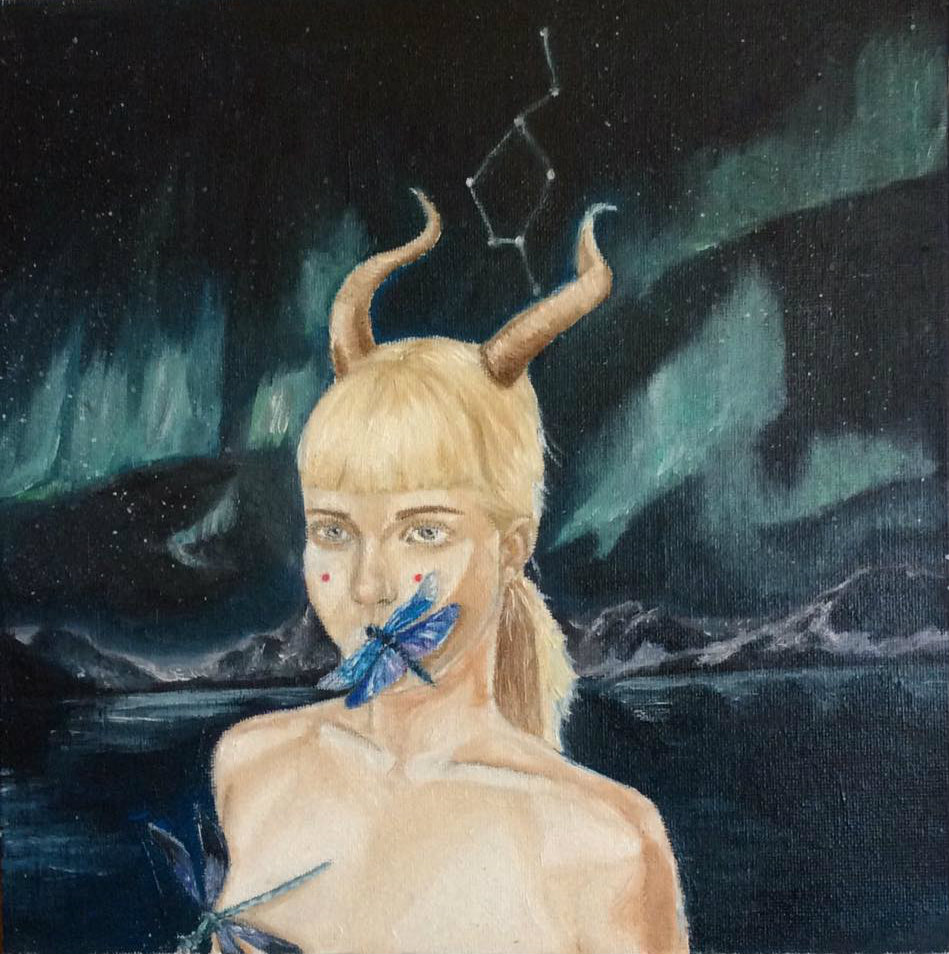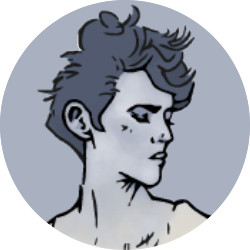
The Interview
You’ve been away from MYTHS for a while now; how have you found the transition from duo to solo artist?
Quinne: It’s been a bit of a difficult transition. There were changes that I didn’t expect. I was, initially, really excited to be able to just do whatever I want and have complete creative control over everything, but I guess because the songs are really personal, everything about it makes me way more nervous. I was having anxiety and panic attacks when I did my first live videos with a couple of friends. I was sick all day, just from anxiety, and I didn’t expect it to happen. My body just shut down. It’s a completely different experience. Also, MYTHS was really performative, so you’re more of a character or a characterisation of yourself, and you’ve got your little buddy, so it’s a bit safer. With this, I’m all alone, and I’m not hiding behind as much, so it’s more terrifying.
So, it would be fair to say you found it more comfortable working with somebody then?
Quinne: Oh, yeah. I mean, now I just doubt myself all the time. When you have somebody else there, you can bounce your ideas off of them, and have somebody to validate you a little bit more before you put stuff out there. Now, I’m just mired in constant self-doubt.
Is this not something you’d experienced before?
Quinne: No, this is new. This is totally new. I was making a little bit of music before MYTHS, but I never put any of it out there. So this is the first time I’m putting music out into the world all on my own.
I guess it’s the reason why I didn’t make much music and put stuff out before MYTHS. MYTHS enabled me to put myself out there. So I guess self-doubt has always been there, it’s just another step of tackling that. The first songs I wrote for the Ivory Towers project were about self-doubt, and it’s like a theme now that I just write about because the project is almost partly about that: overcoming feelings of not being good enough, and I think a lot of people and artists struggle with that all the time. It’s like, you know, “Do I suck?” [laughs] “Is this good enough? Am I good enough?”
I personally thought that Endling was a hugely interesting record, and you must have had lots of similarly positive feedback that makes you excited looking forward.
Quinne: Oh, thank you. Yeah, there’s been some good feedback. I guess people find it stranger than I thought it was, but that kind of always happens to me. I always put things out thinking that they’re totally normal, and then people come back saying that it’s totally weird. We had that with MYTHS too — we thought we were making pop music.. We were not. [laughs] I accept that Endling is a bit weird. It’s a bit of an acquired taste. It’s definitely designed as a deeper listening experience. I spent a lot of time really designing a sonic space within headphones, but you have to kind of spend that time with it to appreciate, I guess, what I was trying to do with that.
So, how natural of a creation was Ivory Towers?
Quinne: It was completely natural. I mean, I was thrown into it when I wasn’t expecting to be. Lief left MYTHS — I was still on the MYTHS tip, but she left, and I’d also been let go from a job that I’d been doing for five years, so I was alone in my apartment: I lost my job and I lost my band and I was watching Netflix until six in the morning. It was like: this is my opportunity to have all of this stuff that I’ve been wanting to do, but hadn’t had the time, or was so focused on MYTHS that I just brushed aside all of these ideas that I had. So, it was like a splurging of all the stuff that I’d been thinking about in the back of mind for years. I’ve been really excited about the microscopic kind of sounds for a really long time, and the power of technology to take the tiniest little sounds and make a song with them. A lot of the songs were kinda just like vomit for a while. [laughs] So, it was completely natural, but at the time it happened, it just kind of had to happen.
And how naturally does creativity strike you?
Quinne: It’s really natural to me. I think every person is creative though; everyone’s creative in their own way. I just go kinda nuts if I don’t make stuff: I get really agitated and aggro if I’m not making things. But, I mean, it’s work like anything else. I appreciate having been friends with people who taught me about the creative process not being that romanticised idea of being hit by inspiration. There are all those romantic ideas about the singer who never knew she could sing, and then she was sick and she could sing and someone heard her. Those discovery stories of, ‘Oh, magic!’ I mean, that kinda stuff can happen, but I think it’s damaging because, really, most artists and musicians toil, like, it’s work, and you have to learn how to make yourself work and do things over and over and over until it works, you know? I was stuck in that for a long time, like, “Why aren’t I making work? Why don’t I like what I do?” Sitting around expecting to be hit by some idea and you’re not, actually, just working.
What is your process as a songwriter, and how has this differed since going solo?
Quinne: The process of writing a MYTHS song and an Ivory Towers song, to me, are totally different. MYTHS was kinda more like a logical little puzzle. We would make a back track and then we would kind of yell over it until it fit. Ivory Towers is way more like letting melodies just appear, picking stuff out of the air — more like, at least to me, a natural process. I’m still tinkering away with getting the process to work and being able to make a song that’s not a total rambling mess. [laughs] But, I’m getting there.
In terms of your process, what is the greatest creative obstacle you face?
Quinne: Percussion. I’m really bad at percussion. I’m working on it… Self-doubt. Constantly questioning. That idea of like an editor, or an idea of what people will think once you make it. I think that’s a hard thing for everybody, and it’s hard to keep out of your brain when you’re trying to just make stuff. Sometimes, it’s easiest to make stuff when you’ve whipped yourself up into some kind of a frenzy: like, you’ve been drinking, or you’re up really really, really late, no-one’s around, and you just have a moment of brain-fury and you can just kinda keep the outer world and your own editor at bay for long enough to break through any preconceived ideas of what you should be doing.
Part of the thing that helps me write is allowing myself to make something that I think is going to be really shitty. I’m like, “Maybe this will suck, but I’m just gonna do it”, and that keeps your editor quiet for long enough that you can actually just work. But, you’re always going to have to, at the end, when the songs are done, edit, and then finally go back and be like: this isn’t working and this is working, and be brutal. But it’s good to separate your editor and your creator.
What motivates you to write?
Quinne: … The inevitability of death. [laughs] And, I’ll go crazy if I don’t work.
How does an intense period of writing affect your mood?
Quinne: If I do something that I’m happy about, I’m the happiest that I ever am. If I’m doing something and it’s not done yet, I just get really obsessed. If I’m working on a song, that’s all I think about and it just goes around in my head constantly. I kinda like that you can sometimes leave things to your subconscious. A lot of the time, I’ll leave a song, and you can putter, but your subconscious will be tinkering away at it: a lot of the time you can get little breakthroughs. But, I’m happiest when I’m making stuff. If I’m not making stuff, I’m kinda miserable.
What do you daydream about?
Quinne: Everything. I’m constantly daydreaming. I daydream conversations with people, disasters… I obsessively daydream about everything. I think my night-time dreams are probably more interesting than my daydreams.
So, should that be my next question then?
Quinne: It used to be something that MYTHS talked about a lot actually, because we both had really crazy dreams. I don’t know if I have a really good one for you right now though. My dream last night was really boring. My night-time dreams, at least, have always given me confidence in the kind of weirdness and magic that can exist. If you feel like life is boring, sometimes you have the most insane dream and you’re like, “No, there’s so much possibility still in the world”, or at least in the art that you know you can create.
If your solo material were a painting, what would it look like?
Quinne: I guess, if I tried to visualise the music, it would be a painting where, the more you looked at it, the more you realised you could see through the layers into infinity.
Okay, a slightly easier question. From what non-musical sources do you take inspiration?
Quinne: Nature is a huge inspiration. I get really obsessed with the natural world: animals, plants. I just wrote a song about the ocean, and I was reading about it a bit, and how deep it is, how unexplored it is and how there are some areas where we don’t even know how deep it is. We don’t know what’s down there, and I’ve always had kind of a fear of the ocean — miles and miles and miles down, and you don’t even know what’s down there. And, how huge the animals are!
Books, a little bit. A lot of childhood memories and folklore, stories of the paranormal and supernatural. I was really interested, especially when I first found Tumblr… There are teenage girls talking about what they’re going through, and kind of seeing my younger self in that, and trying to write in a way that I think maybe would’ve given me comfort when I was younger.
How do you feel that your personality is reflected in Ivory Towers?
Quinne: I mean, the idea was that it would very much be about my real self, but any project that you do usually ends up being kind of an exaggerated form of part of yourself. I think the goal is to make it as true to your own personality as possible. I don’t know how good of a job I’m doing yet. [laughs] I’m trying to do a good job but… it’s tricky. I think I’ve kinda got the morbid curiosity part of my personality down.
What is it that you think you’re missing?
Quinne: I don’t know! I don’t know if I know what I’m missing. I’m trying my best not to be too navel-gazey. You have to be a little bit that way to write about what you know and try to be authentic in what you’re putting out, but I also worry that I’m gazing at my own navel a little bit too much. I’m constantly worried about that.
To what extent do you feel your musical output defines you as a person?
Quinne: I think my creative output, in one way, completely defines me. I don’t know how I would be alive if I wasn’t making things, but, I’m not sure how much you could listen to Endling and know what I’m like. It’s always surprising when you consume somebodies work: like, listen to a musician’s music and then meet the musician. It’s usually kind of shocking. But, being a creative person making stuff, I think that is the biggest part of who I am.
Moving onto the record. How do you feel about Endling?
Quinne: Hmm… I’m already making new music and I feel excited about getting better and getting closer to what Ivory Towers ultimately could be. But, I’m happy with it… It’s one of those things: there are such intricate little songs that I kind of forget about what they were like, and then I listen to them again and I’m like, “Oh!” [laughs] I just started playing live, and that’s given a whole new dimension to the songs. Some of them I can’t even do live because they’re so precarious. I got really into making these songs that were just on the verge of completely falling apart. If I tried to do them live… there’s just no way. [laughs] But, some of the other songs are taking on new dimensions and that’s really exciting. I’m glad that people can listen to it and appreciate what I was trying to do. You know, it’s like a whole little world unto itself.
Given that, and given how you mentioned earlier about the tracks being a little bit weird, do you feel that sometimes you’d just like to sit people down, stick a pair of headphones on them and say, ‘Just give it a chance!’
Quinne: Noooo, I know it’s not for everybody. It was the same thing with MYTHS. I’ve made music that’s not for everybody for a while, and I’ve gotten used to prefacing my talking about the music I make with people being like, “You probably won’t like it.” [laughs] I’m interested in kinda going both ways with the new music I’m making. I’m interested in making some songs that are so close to not even being music, and the other stuff that’s more accessible. But, I understand when people don’t get it or aren’t into it. It kind of demands a lot, I think, in some ways, so that’s okay.
How do you intend to do that: appeal slightly more to people who are perhaps a little less patient, as well as going the opposite way?
Quinne: Well, I was really resisting certain aspects of more pop music production, and then I actually just went and listened to a bunch of my favourite music and was like, “Oh, there is just very poppy music production in a lot of this stuff. There’s 4/4 percussion, there’s kind of dance percussion, there’s regular song structure.” I don’t have to do that, but I can acknowledge that most of the music that is my favourite music, or the music I like to listen to, has those elements, so it wouldn’t kill me to try to incorporate some of them. It is fun, kind of doing so. I could try to make the poppiest song in the world, and it would still end up being completely strange. I don’t think I’m even capable of making a super-accessible poppy song anyway, but I think I’ll just try to satisfy all of my desires, and we’ll see what happens.
Finally, looking forward, what excites you most about this project in terms of what you can achieve with it from a personal perspective?
Quinne: Well, the great thing about music and the technology that we have… I make all my music on my computer. I’ve got Ableton. You can do anything! I think I know how to use maybe fifteen percent of what Ableton can do, and I think there are people who know way more about it who actually jut get completely overwhelmed. And, the time that we live in, people are open-minded enough to accept almost anything that you’re willing to do, so in some ways it’s intimidating, in some ways it’s just exciting. I have the most amazing tools to just create almost anything I want — it’s unlimited. It’s very exciting.
 Ivory Towers featured on
Ivory Towers featured onYou can keep up with all things Ivory Towers on her Facebook, Twitter and Tumblr pages, and grab 'Endling' on pay-what-you-can terms over on Bandcamp.
If you enjoyed reading this interview and happen to think we're doing something right, please consider sharing the link -- whether on social media, or just with a friend, it'd really help us out! We're also on Facebook, Instagram (@alonelyghostburning) and Twitter, so if you'd like to keep up-to-date with the publication of new content, and also provide us with a whole heap of motivation, please do give us a like or follow.


